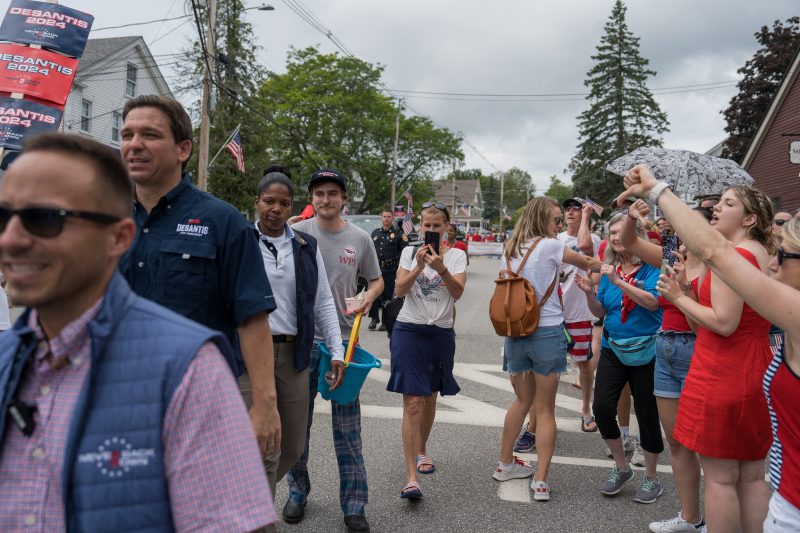Attempting to put the best possible face on the state of his candidate’s campaign, a spokesman for Florida Gov. Ron DeSantis’s bid for the 2024 Republican nomination summarized the state of the race for Axios.
“No matter how much the media and D.C. elites try to destroy Ron DeSantis,” Andrew Romeo said, “they can’t change the fact that this is a two-man race for the nomination.”
Setting aside the breathless effort to blame the all-powerful media for DeSantis’s failure to gain any traction after formally entering the contest two months ago, it’s worth noting the caveat that applies to Romeo’s presentation. Yes, at the national level, DeSantis has a healthy lead over every other candidate who isn’t named Donald Trump. But in new state-level polling conducted by those D.C. elites at Fox Business, DeSantis is just another member of the trailing-Trump pack.
Fox Business evaluated support in the primary among likely voters in Iowa and South Carolina. Those are two of the earlier states to vote and, therefore, are likely to help shape the field as candidates are winnowed out. In each state, Trump leads the next-closest candidate by at least 30 percentage points. In each state, DeSantis is in a statistical tie for that second-place position. In Iowa, he gets 16 percent of support compared with 11 percent for Sen. Tim Scott (R-S.C.). In South Carolina, he gets 13 percent vs. 14 percent for the state’s former governor, Nikki Haley. (Scott gets 10 percent there.)
Interestingly, when the pollsters asked which candidates were the respondents’ second choices, the picture diverged from what we’ve seen in national polling. In Iowa, DeSantis was the second pick of less than a quarter of respondents while Scott is the second pick of 15 percent. In South Carolina, the South Carolina Republicans are both identified as second choices about as often as DeSantis is.
This is hugely problematic for DeSantis. The reason the DeSantis campaign spokesman is so insistent that the governor and Trump are the only two viable candidates is to reinforce that those interested in blocking Trump’s path to the nomination have nowhere else to go. But voters in Iowa and South Carolina — who, again, will help set the field early next year — don’t view DeSantis that way.
There are interesting divides within the results. College-educated voters give Trump smaller advantages (though still an advantage) while those without a college degree and those who identify themselves as “very conservative” give Trump wider margins. That too isn’t great for DeSantis, who has staked a lot on being the candidate for the fringe right.
Asked whether they would or wouldn’t support candidates, we see that the demographic splits shown above are still present. Notice that likely primary voters with college degrees in Iowa are no more likely to say they’d vote for DeSantis than Trump, despite more of that group saying they definitely wouldn’t back Trump. In South Carolina, those with college degrees are much more likely to say they’d vote for Trump.
In both states, voters (including those very conservative voters to whom DeSantis wants to appeal) say that beating President Biden is more important than that the candidate shares their views on issues.
In each state, the percentage of voters who say Trump has the best chance of beating Biden is about the same as the level of his overall support. In one bright spot for DeSantis, more primary voters in Iowa think he’s the best bet for beating Biden than support him overall — but twice as many voters still say Trump’s the better bet in that regard.
Breaking down the issues important to Republicans in each state shows another advantage for Trump. Among those who say economic issues, immigration or social (read: culture war) issues are their most important issues, Trump gets a plurality of support in each state.
On social issues, though, he’s statistically tied with DeSantis in Iowa. But only 1 in 8 likely voters says that’s their most important issue, compared with more than 4 in 10 who identify economic issues. And those who say that the economy is their most important issue are about three times as likely to back Trump.
In South Carolina, Trump’s advantages are even wider, thanks to the home-state candidates pulling more support.
Earlier this month, NBC News published an internal memo created by the DeSantis campaign for donors and supporters. It argued, among other things, that “early state voters” — like those in Iowa and South Carolina — “are only softly committed to the candidates they select on a ballot question this far out,” a tendency that applied to Trump supporters as well. The Fox Business polling in Iowa and South Carolina (like the poll in New Hampshire) shows that Trump’s support is actually firmer than that of other candidates.
In these polls, in other words, DeSantis is just another candidate. This isn’t just bad for DeSantis in that he hasn’t overtaken Trump. It’s bad for him in that this suggests a downward path: from clear second-place candidate to member of the second tier. And for the candidate long pitched as the viable non-Trump candidate, being less viable is a big problem.

